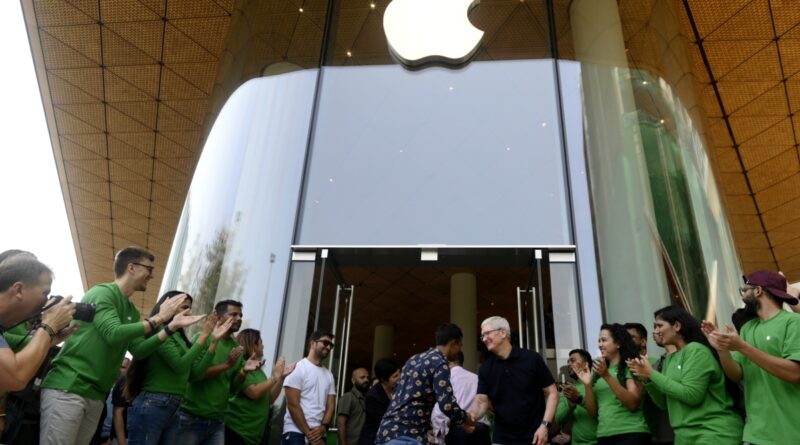Apple opens its first retail store in India but customer challenges persist
Apple chief executive Tim Cook opened the first Apple store in India on Tuesday in a significant milestone for the iPhone maker roughly 25 years after entering the South Asian market. During his India trip, his first in years, Cook has planned meetings with prominent business leaders, including Reliance’s Mukesh Ambani and Tata Group’s Natarajan Chandrasekaran, as well as Prime Minister Narendra Modi as Apple steps up its battle against Samsung over the luxury smartphone market in Asia’s second-biggest economy.
The U.S. giant’s first official store — and a second retail location is scheduled to open in New Delhi on Thursday — comes at a time when Apple is ramping up its manufacturing drive in India, hoping to turn one of the world’s largest smartphone markets into a key global iPhone assembling hub.
Apple’s iPhones currently assume less than 5% of the Indian smartphone market, but the share has grown in recent years as more Indians buy premium handsets. The opening of Apple’s 20,000-square-foot store in the Reliance-owned high-end shopping mall in the financial capital Mumbai attracted hundreds of people who queued to see Cook open the glass doors.
The establishment of Apple’s first retail stores and the company’s increased efforts to assemble iPhones and other products in India underscore the importance of the South Asian market to the Cupertino-based tech giant. According to JPMorgan analysts, Apple is expected to expand its manufacturing capacity in India to produce 25% of all iPhones by 2025.
The company’s increased production is already beginning to pay off. Apple exported more than $5 billion worth of smartphones from India, nearly half of all the exports from the country, in the financial year that ended in March, according to industry analysts.
“At Apple, our mission is to enrich lives and empower people around the world,” Cook said in a statement Monday. “India has such a beautiful culture and an incredible energy, and we’re excited to build on our long-standing history — supporting our customers, investing in local communities, and working together to build a better future with innovations that serve humanity.”
However, the benefits of these initiatives have yet to be fully realized by one crucial stakeholder: Apple’s customers.
Despite local iPhone assembly and the company’s contract partners reaping the rewards of New Delhi’s generous incentives, Apple products, including the iPhone, remain prohibitively expensive in India in a move that has stunned analysts who thought Apple will pass on the incentives to customers.
Take the base model iPhone 14 Pro, for instance. It is priced at $999 in the U.S. but retails for close to $1,600 in India. The iPhone 14 is not an isolated example, of course. The second-generation HomePod, which retails for $299 in the U.S., costs $401 in India.
Official iPhone cases are similarly priced to some of the country’s top-selling Android smartphones. It’s no surprise, then, that Google’s Android commands about 97% of the local smartphone market, according to market intelligence firm Counterpoint.
Moreover, even after paying a hefty price, Apple customers in India do not get access to scores of services. Several popular Apple services, such as News+, Fitness+, and Apple Pay, remain unavailable to Indian consumers. The Apple Card and its accompanying savings account feature in the U.S. are also absent from the Indian market. Apple Maps and Siri offer fewer features to Indian customers.
In contrast, many global giants, including Google, Facebook, Amazon, Walmart and Samsung, have plowed tens of billions of dollars in India in the past decade and offer nearly all of their global services to Indian customers — often at dirt-cheap prices. Google Pay and Walmart’s PhonePe lead the mobile payments market in India.
The reality is that millions of Indian consumers continue to purchase Apple products despite feeling like second-tier customers. While Tim Cook’s visit to India every five years is a noteworthy event, it has yet to bring about substantial change for the country’s Apple enthusiasts.
Apple opens its first retail store in India but customer challenges persist by Manish Singh originally published on TechCrunch





